People Online Descend On Redditor Who Neglected Sister’s Dog With The Excuse Of "Letting A Dog Be A Dog"
Most dog owners humanize their pets to some extent. This is acceptable as long as it doesn't happen frequently and the dog is allowed to act like a dog for the majority of the time, especially when it's out and about with other dogs.
If it’s safe, then you should allow dogs to explore because it is in their genetic makeup. They should interact with other sociable dogs because they are also very social animals (unless your dog is problematic).
Many dog breeds have old-fashioned hereditary genes that cause some of their behaviors, so let your dog occasionally exercise these traits by letting them do what they want.
They enjoy going on excursions with their owners, discovering new things, venturing out, sniffing every blade of grass nearby, swimming, digging holes, hiking, and running around till they pass out and snore.
Finding innovative ways to give dogs access to the activities they enjoy doing naturally is the essence of "letting a dog be a dog," not neglecting them as this Redditor did. So it happens that the Redditor’s sister gifted herself a dog for her birthday.
She totally spoils this dog since she’s child-free, but the OP was of the opinion that "a dog is a dog." This dog was left in the care of the OP as the sister had to travel out, but the OP ended up neglecting the dog's duties.
How the story starts...
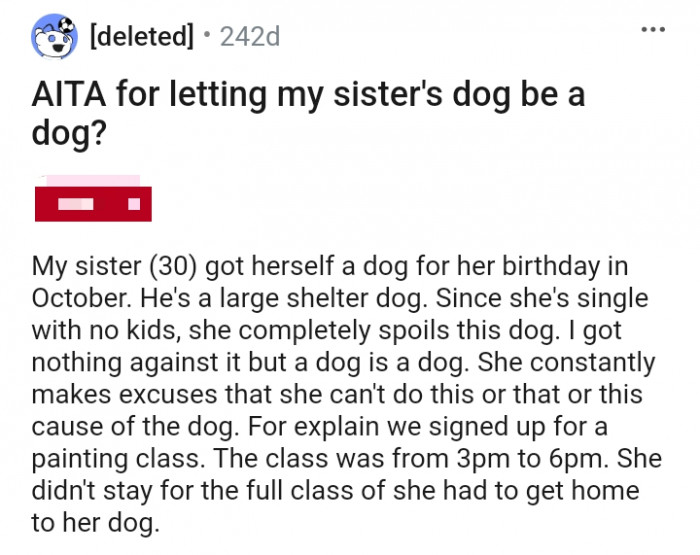
OP took care of the dog
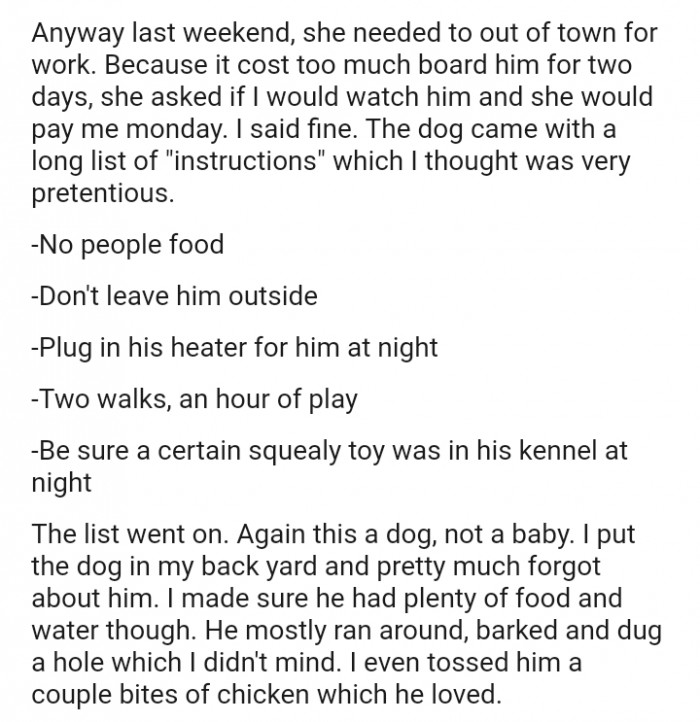
She didn't like the list
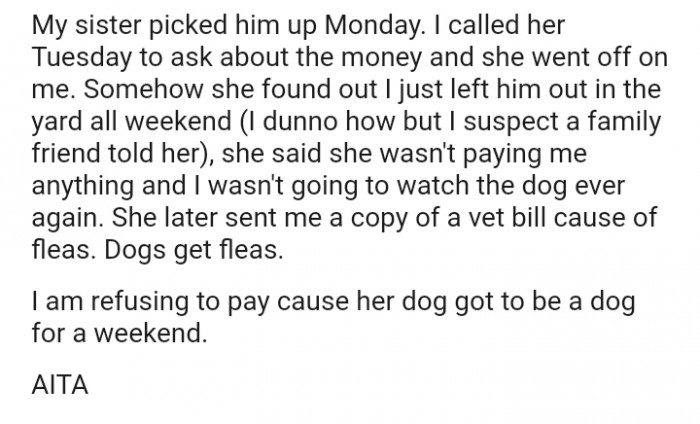
The Consequences of Neglecting Animal Welfare
This situation raises critical concerns about animal welfare and the responsibilities that come with pet ownership. Dr. Laura Smith, an animal welfare expert, emphasizes that neglect can have profound impacts on an animal's physical and emotional health. Research shows that animals left unattended can suffer from various issues, including anxiety and behavioral problems.
According to findings in the Journal of Animal Welfare Science, neglecting a pet's needs can lead to long-term consequences that affect not only the animal but also the owner’s emotional wellbeing as they grapple with guilt and shame.
Understanding Neglect and Responsibility
Research indicates that neglecting a pet's needs can stem from underlying emotional issues, including avoidance or denial.
Dr. Karen Overall, a veterinary behaviorist, emphasizes the importance of recognizing when one is overwhelmed by responsibilities, which can lead to neglect.
Understanding these dynamics is key to preventing harm to animals and ensuring proper care.
Comments flower in their hundreds and each of them condemned the OP's action. Some even suggested that the OP needed therapy for just neglecting a dog the sister paid to look out for.
Here are some of the comments below...
1. None of these are unreasonable things

2. Never get a dog and never have kids

3. You can't dictate how she treats her dog
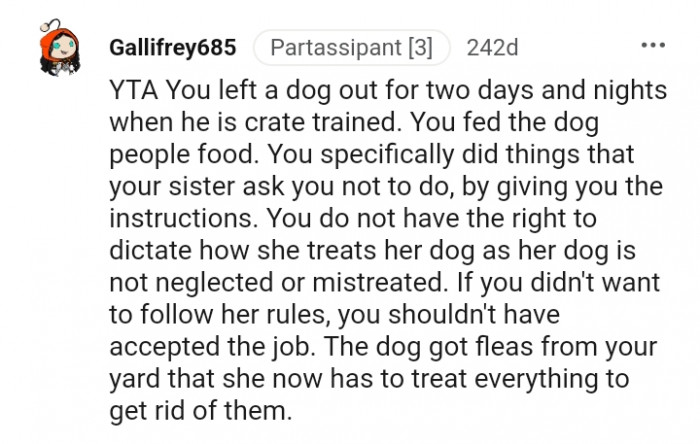
This scenario also highlights the psychological aspects of responsibility and commitment in pet ownership. According to Dr. Shawn Achor, a positive psychology researcher, "The decision to welcome a pet into your life should come with a clear understanding of the responsibilities involved." He emphasizes that individuals who are informed about the long-term needs of pets are more likely to exhibit responsible behaviors. Furthermore, recognizing the emotional and financial commitments required can help potential pet owners make informed decisions and prevent neglect, as stated by David Bach, a financial author who notes, "Understanding the financial implications of pet ownership is crucial to ensuring a loving and sustainable environment for our furry friends."
Studies show that individuals who adopt pets without understanding the commitment involved may experience guilt or defensiveness when faced with their limitations.
According to the Journal of Applied Animal Welfare Science, these feelings can lead to justifications for neglect that ultimately harm the animal.
Addressing these emotional responses is crucial in promoting responsible pet ownership.
4. You don't like her rules then don't watch her dog
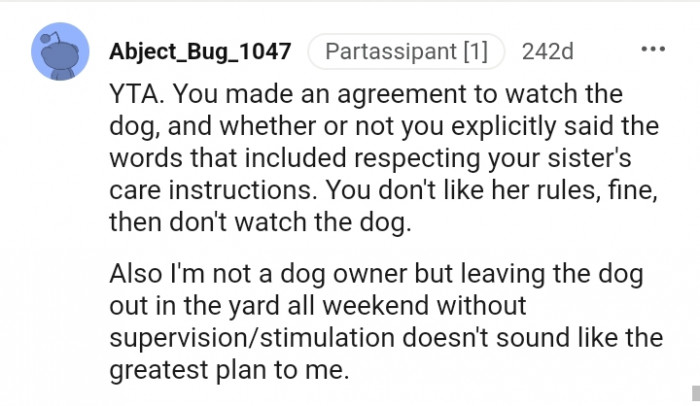
5. Single people with no kids take care of their pets
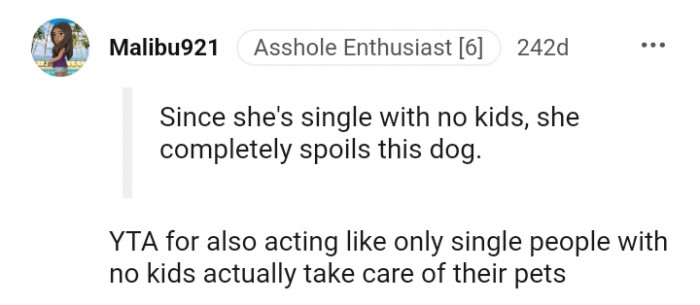
6. You were hired to watch your sister's dog
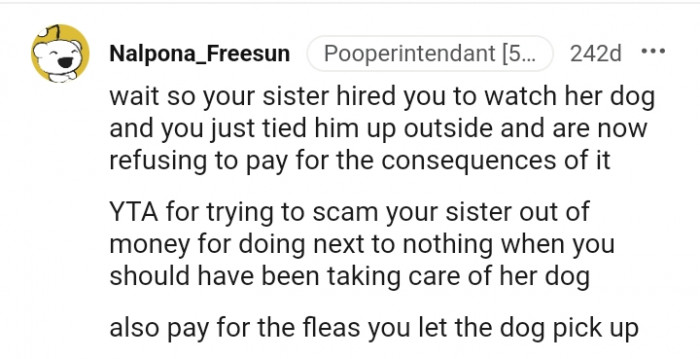
Establishing Responsible Pet Ownership Practices
To combat neglect, pet owners should prioritize education and community support. Engaging in local pet owner groups can provide valuable resources and foster a sense of accountability. Research shows that communities with active support networks for pet owners often report higher levels of responsible pet care.
Additionally, advocating for pet welfare education in schools can help future pet owners understand the importance of their roles and responsibilities. This proactive approach can cultivate a culture of compassion and responsibility towards animals.
Practical Solutions for Responsible Pet Ownership
For individuals struggling with the responsibilities of pet ownership, creating a support system can be beneficial.
Connecting with local animal welfare organizations can provide resources for training and behavioral support, reducing feelings of overwhelm.
Additionally, establishing a routine for pet care can enhance responsibility and ensure that the animal's needs are consistently met.
7. Why offer to do so if you weren't willing?

8. According to this Redditor, the OP needs therapy

9. You should have said if you wouldn't do it

Moreover, implementing regular check-ins with veterinarians can ensure that pets receive adequate care and attention. Studies indicate that regular veterinary visits contribute significantly to the overall health and wellbeing of pets. This not only addresses physical health but also helps owners stay connected to their pets’ emotional states and needs.
By fostering a relationship with veterinary professionals, pet owners can enhance their understanding of responsible pet ownership and mitigate the risk of neglect.
Engaging in self-reflection about one's motivations for pet ownership can also foster greater accountability.
Recognizing the emotional significance of these relationships can inspire individuals to prioritize their pets' needs over personal stresses.
Ultimately, fostering a sense of responsibility and commitment can lead to healthier relationships with pets.
10. All these are perfectly reasonable expectations

11. You neglected your sister's beloved pet
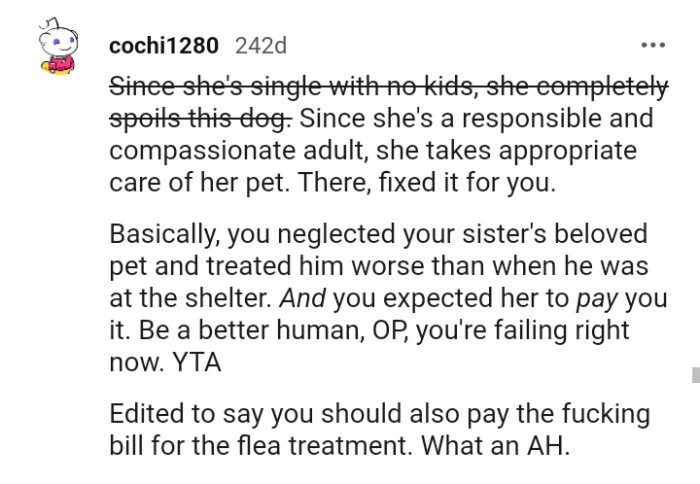
12. The instructions were not over the top

13. Dogs are animals but they are domesticated

14. If you can't respect someone's rule, don't lie

15. This does not sound responsible at all
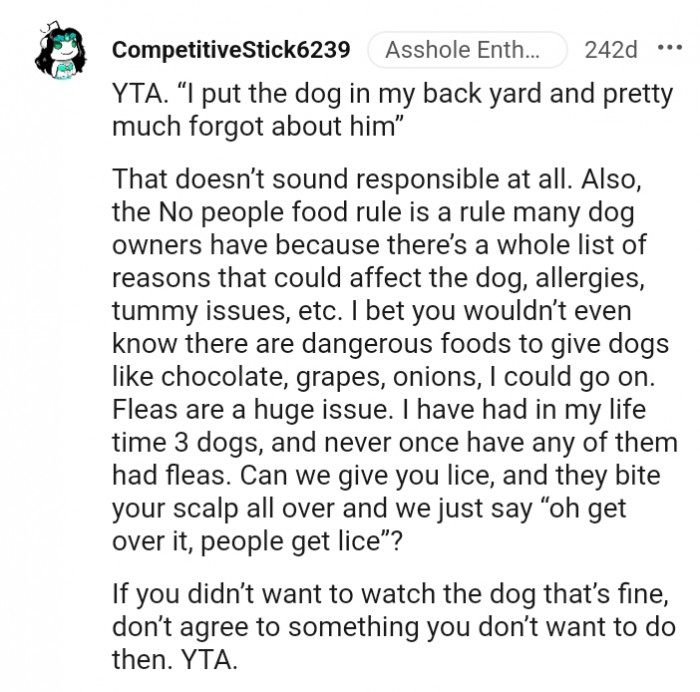
16. The list is not that atrocious
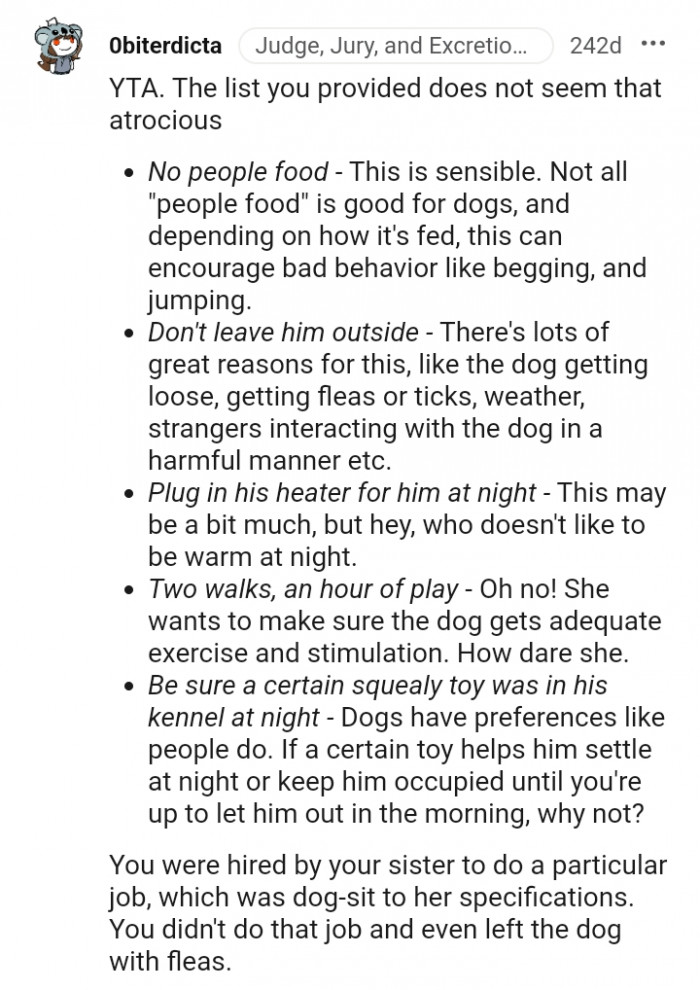
17. She takes care of her dog so why can't you?
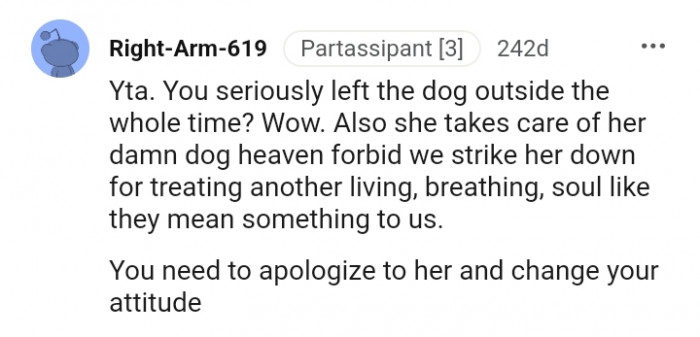
18. You either agree to her conditions or you refuse the job
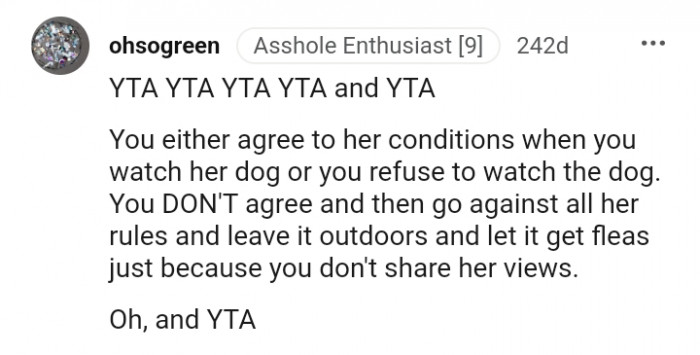
19. You should not have agreed in the first place

20. The OP is really a cruel person

The comments alone tell you how angry Redditors were with the OP. Some even concluded that the OP wasn't fit to have kids and we certainly can't help but agree.
You don't treat a dog that way just because you want a dog to be a dog. What are your thoughts about this story?
Drop your replies below and share this post as well.
Psychological Analysis
This situation illustrates the emotional turmoil often associated with neglecting a pet's needs, which can stem from unresolved feelings of inadequacy.
Recognizing these emotions is essential for moving forward and making responsible decisions about pet care.
Analysis generated by AI
Analysis & Alternative Approaches
Addressing the complexities of pet ownership requires a nuanced understanding of emotional dynamics and responsibilities.
Research indicates that open communication and proactive planning are vital in ensuring the well-being of both pets and owners.
Ultimately, fostering a supportive community can also play a crucial role in navigating these challenges successfully.
Analysis & Alternative Approaches
This incident highlights the urgent need for awareness surrounding animal welfare and responsible pet ownership. Mental health professionals stress the importance of education and community support in preventing neglect and fostering compassionate relationships with pets.
Ultimately, by prioritizing education and regular care, pet owners can create a nurturing environment that benefits both them and their animals.



